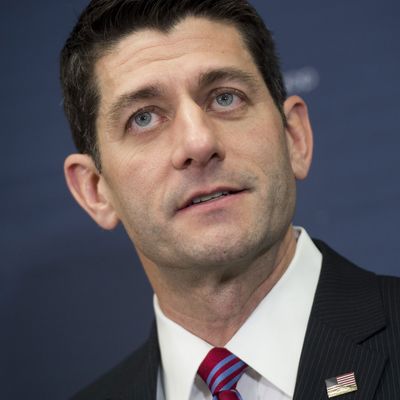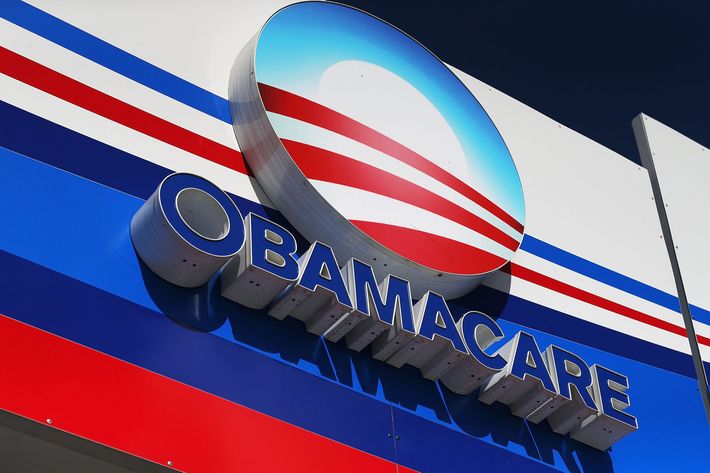
Last night, House Republicans voted once again to repeal Obamacare and replace it with their consensus-preferred alternative, which is the system that preceded Obamacare, which is also known more colloquially as “nothing.” Republicans are celebrating this latest vote as a new triumph for their cause, and have made a weirdly big deal about forcing President Obama to cast a veto of it. In a very technical sense, the repeal measure is advancing one step farther now, since Republicans will use a reconciliation bill to overcome a filibuster, meaning the bill will be killed by a presidential veto rather than die in the Senate. The bigger picture is that the anti-Obamacare cause has never been in worse shape. The policy rationale for repealing the Affordable Care Act continues to disintegrate, while the political conditions to replace it with an alternative have collapsed entirely.
It is and always has been true that those who oppose the Affordable Care Act on principle — they philosophically disagree that government has a proper role regulating the insurance market and subsidizing access to health care through taxes and spending — have no reason to support it. But conservatives have never been willing to lean on the ideological case against the law. Instead, they have insisted fervently that the law will fail, (or is failing, or is about to fail) on its own terms. They have refused to give up this claim even in the face of an ever-higher mountain of evidence.
The Wall Street Journal editorial page, touting the House’s latest repeal vote, wanly insists that Obamacare really is failing, just as they have always said. “Liberal spin can’t disguise that the law is failing on every level other than expanding coverage — as if anyone ever argued that a new entitlement couldn’t reduce the uninsured rate.” First of all, the notion that the law is failing on its non-coverage goals is false. Aside from expanding coverage, Obamacare set out to finance the cost of coverage expansion with taxes and spending cuts, and hold down the long-term rise in the cost of of medical care. On all these measures, it is clearly succeeding. Health-insurance premiums remain far below initial forecasts, and the law is expected to cost the federal government more than $100 billion less than initially projected. National health-care spending is rising at its slowest rate in five decades. Just this week, two new studies confirm the law’s success. One of them finds that people in states that participated in the law’s Medicaid expansion enjoyed increased access to medical care and lower medical bills, confounding skeptics who claimed Medicaid would not help its beneficiaries. Another concludes that employers have not shunted their workers into part-time employment to skirt the law’s coverage requirement, confounding another frequent prediction from critics. (The Journal itself insisted over and over and over again that this was happening.)
Most amusing is the Journal’s insistence that Obamacare’s massive, historic reduction in the uninsured rate doesn’t really count as a success since nobody doubted it would pull it off. In fact, lots and lots of conservatives insisted exactly this. Especially in the early days of the law’s struggles, when conservatives proclaimed Obamacare a “train wreck” that would “collapse of its own weight,” right-wing media was filled with stories projecting that it would throw more people off their insurance than would gain it. “Top Health Economist Predicts Obamacare Will Ultimately Boost Number of Uninsured,” blared a not-atypical 2014 headline in the Daily Caller. Obamacare, predicted Rand Paul, “will lead to less people having an insurance as they find out the insurance is so much more expensive than their current plan.” The most esteemed conservative intellectuals endorsed this prediction. “At the end of the day, for all of the rhetoric and promises about what Obamacare would achieve, the health law’s most ardent supporters have stuck to their guns because of one thing: coverage expansion,” wrote Avik Roy, now an adviser to the Rubio campaign. But new data suggests that Obamacare may fail even to achieve this goal. Instead of expanding coverage to those without it, Obamacare is replacing the preexisting market for private insurance.” Charles Krauthammer insisted it would result in “essentially the same number of uninsured.”
The Journal itself predicted in 2013 that “The insurance terminations and rollout fiasco could leave more people uninsured in 2014 than in 2013,” which was wildly wrong. The next year, it gloated, “The predicted ‘surge’ of young beneficiaries [signing up for insurance in the exchanges] isn’t materializing even as the end-of-March deadline approaches,” which also turned out to be completely wrong. Today’s Journal argument that reducing the uninsured rate among non-elderly Americans almost by half doesn’t count as success because only a complete idiot doubted this would happen really ought to mention that the Journal itself sided with the complete idiots.
Obamacare’s “failure” is a theological premise on the right, but events have continued to test the faith of the adherents. They need to supply specific policy failures in the law to justify the repeal crusade, but they cannot devise any solutions to problems that don’t actually exist. They are left with their circular conviction that Obamacare is evil because it is Obamacare.

In Kentucky, newly elected governor Matt Bevin ran promising to destroy the hated law, which is working well in his state and demonstrably improving the health of its citizenry. Faced with a conflict between his ideology and reality, Bevin has chosen a bizarre compromise. He is turning the operations of Kynect, the popular, state-run insurance exchange, over to the federal government. And he is promising to put his state’s government in charge of the law’s Medicaid expansion. The background here is that Obamacare is designed to cover the poorest uninsured citizens by expanding Medicaid, a federal program, while offering coverage to more affluent people through state-run exchanges. Bevin is simply inverting that design out of sheer spite. Obamacare wants a federal program for the poor and a state program for the middle class? Well, then, he’ll insist on putting his state in charge of the program for the poor and making the federal government run the program for the middle class!
There is no ideological reason why a Republican would prefer to federalize one of those programs but not the other. It is simply a demonstration of spite, allowing Bevin to posture against the law without having to live with the costs of actually forgoing its benefits. Kentucky is a vision of Obamacare repeal-and-replace in action — a body lurching forward and thrashing about after its head has been cut off.
The same trap awaits Republicans elsewhere. The House repeal vote, like every previous repeal vote, contained no alternative except the restoration of the cruel, bloated, dysfunctional system that predated the Affordable Care Act. As they have done since the health-care debate began in Congress nearly seven years ago, Republicans promise they will coalesce around a partywide alternative any day now.
Republicans understand that the status quo ante is too unpopular for them to formally endorse. On the other hand, actually voting for a single plan for which all Republicans can be held accountable — as opposed to a variety of half-written plans that they can gesture to as evidence that plans exist, without having to own the details — is political kryptonite. The GOP’s best and only asset in the health-care fight is dissatisfaction with the status quo. But any Republican plan would disrupt the status quo more than Obamacare did.
The biggest single impediment facing Republicans in devising their replacement is finding a funding source. Every plan conservative policy entrepreneurs have devised has arrived at the same solution: Eliminate the tax deductibility of employer-sponsored insurance. Conceptually, this makes a great deal of sense. Economists agree that the deduction distorts employer decisions: It lets employers give their workers insurance tax-free, but taxes their wages, thereby encouraging them to spend more on insurance and less on wages. Obamacare actually took a step in the direction of curtailing this break by cutting off the deduction only for the most expensive health-insurance plans. This measure came to be known as the “Cadillac tax,” for its limited focus on the costliest (i.e., Cadillac-like) plans.
That feature has perhaps proven to be the law’s most unpopular element. It is so unpopular that Republican opponents in Congress have been joined by numerous Democrats in Congress, as well as the three Democratic presidential candidates, to denounce it. It has become hard to imagine how the Cadillac tax can survive.
While the law has several other intact cost-control elements, this is a setback for Obamacare. It is far worse for the Republican proposals. The backlash against curtailing the tax deduction for employer-provided health insurance, while a painful cut for Obamacare, is a lethal wound for the prospects of replacing it. If scaling back the tax break for the most expensive insurance plans is too unpopular for Congress, then the full-scale elimination contemplated by conservative health-care experts is totally unthinkable.
The Journal acknowledged this dilemma several months ago. “GOP reformers also recognize that the Cadillac tax on high-cost employer-sponsored health plans is a heat shield that might let them solve some of the problems of the pre-2010 health finance status quo,” noted an October editorial. “Substituting a cap on the tax-code subsidy that helps drive medical inflation is more politically plausible with the Cadillac tax in place than without.” This is one thing — perhaps the only thing — the Obamacare-haters got right. The project of designing a conservative Obamacare replacement hinges on expanding the feature of Obamacare that is plunging into the political abyss.
Republican opposition to Obamacare works if and only if the party can identify itself as favoring some unstated alternative. Having an actual alternative, which would impose pain on identifiable constituencies, is politically worse than having nothing. The party has relentlessly paired its opposition to Obamacare with pledges to start fresh on an alternative. But what do you call it when government officials spend more than a half-dozen years promising something is just around the corner, and failing to deliver? You’d call it exactly the kind of bureaucratic catastrophe they have falsely characterized Obamacare.






























